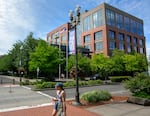
Vancouver City Hall, Vancouver, Wash., June 29, 2024.
Anna Lueck / OPB
If the Association of Washington Cities gets its way, this January lawmakers will take up a proposal to increase how much cities can collect in property tax revenue from their voters. Right now, cities can request up to 1% of property tax revenue to head into their budgets. The group that lobbies for cities is searching for a legislative sponsor on a proposal that would increase that number to 3%, which the association says would help cities fund law enforcement and keep pace with inflation.
“It’s not a magic bullet to pay for everything that a community needs; all the police officers that they need. It’s just hopefully creating a little bit more balance between property tax and other revenue sources to help fund those community needs,” said Candice Bock, the director of government relations with the Association of Washington Cities.
The 1% limit for how much cities can currently collect dates back to 2001. That’s when anti-tax activist Tim Eyman led the passage of Initiative 747. When enacted into law, it limited tax district levies to increases of 1% of property taxes collected. Anything above that amount had to be approved by voters during an election. Before Initiative 747, cities and other tax districts could increase their revenue up to 6% annually.
The effects of that legislation has reverberated in cities like Vancouver, where rapid growth has put pressure on local budgets. In November, city officials tried to convince voters to pass a tax levy “lid lift” to increase property tax revenue above the 1% cap so they could pay for 80 new police officers and other public safety services. Residents voted the proposal down, despite the Vancouver Police Department’s claims that it is among the lowest staffed departments in the state compared to population.
“That 1% is just extremely limiting,” Vancouver City Manager Lon Pluckhahn said.
Pluckhahn said the city’s current property tax revenue doesn’t keep up with inflation, but increasing it to 3% would make a difference over time.
“If inflation is sub 3%, then at least you’re keeping up with the increasing costs of electricity and utilities and vehicles, and all the other things that we have to buy,” he said.
The 1% property tax limit has a “strangling impact” on small cities in Washington, according to Camas Mayor Steve Hogan. Property tax revenue goes into the city’s general fund, where it pays for big-ticket items like police and fire, as well as smaller costs like sports fields, cemeteries and school resource officers. The 1% limit forces cities to prioritize which services get money.
“It’s a shame because you’re gonna have to short all sorts of different areas of public service,” Hogan said. “The police, the fire, the EMS, your libraries. If you’ve got people that have kids in school but two people have to work, or a single mom or a single dad that are trying to get their kids through grade school, if the library’s not open, you’re screwed.”
Increasing the property tax cap to 3% would cost less than $20 per year for the average homeowner, according to the initial proposal from the Association of Washington Cities. Increasing that limit has proven stubbornly difficult over the years. Democrats introduced a similar bill in 2024 to increase the cap to 3%, but they later withdrew it after it was attacked in the media by Republicans and lost support from voters. That was after a 2017 proposal that would have allowed governments to increase property tax revenue up to 5% per year also failed.
Ed Orcutt, R-Kalama, is one of the Republican lawmakers who opposed the past bills. He argues that property tax revenue is less important than Washington cities make it out to be, since they also collect money from sales and utility taxes. Instead of cities resetting the bar for how much money they can take in from property taxes, he said, they should instead rely on getting voters’ approval for funding needs through the current ballot process.
“If counties and cities are going out and they can’t get a lid lift, it’s because they don’t have the trust of the people and they better get to work earning that trust,” Orcutt said.
Amidst this possible renewed debate in the Legislature, Washington state is facing a projected $10-12 billion budget shortfall over the next four years because of lower-than-expected revenue and increased costs to maintain current state programs. It is unclear how much that deficit could affect cities like Vancouver. Gov. Jay Inslee’s budget will be released in mid-December.
Pluckhahn, Vancouver’s city manager, said the deficit could create downstream effects if the state starts to allocate more taxes for its projects and leaves less for cities, but first they will have to see the governor’s budget proposals.
“We don’t know for sure how that is all going to shake out, but the fact that it is a very large number is concerning,” he said.
